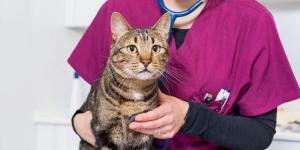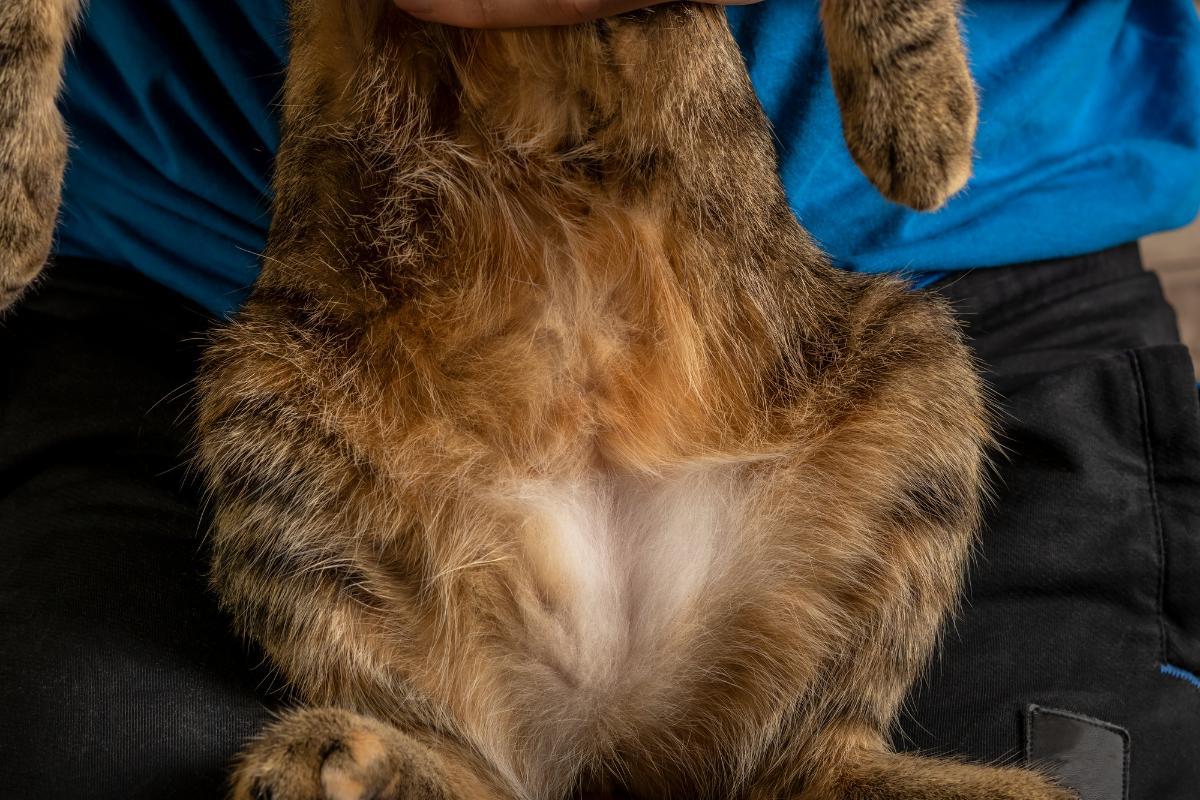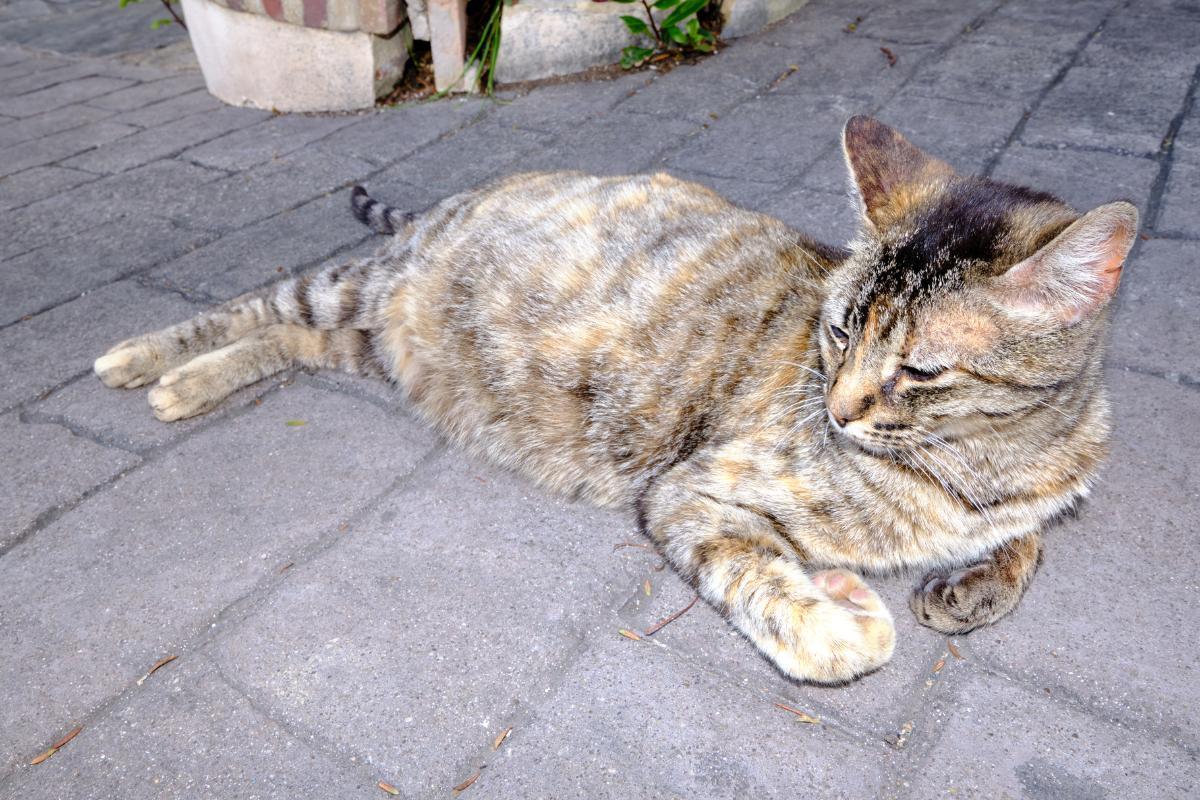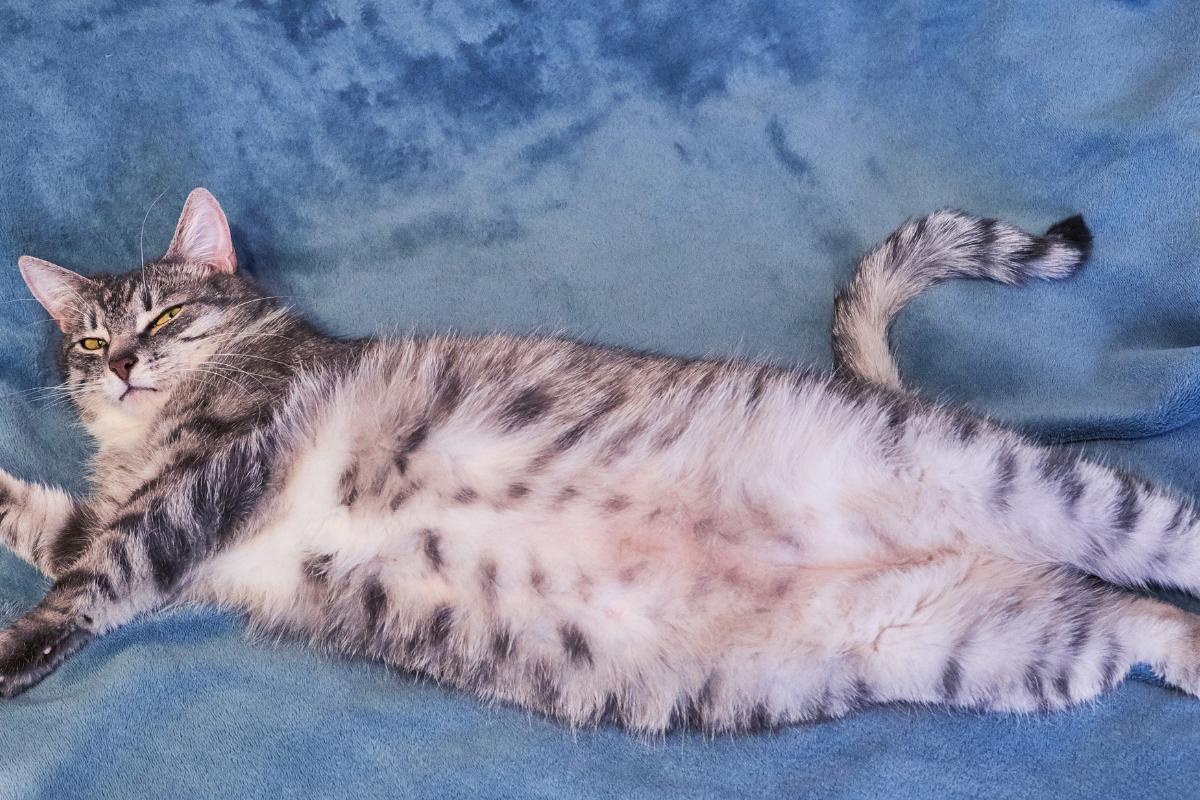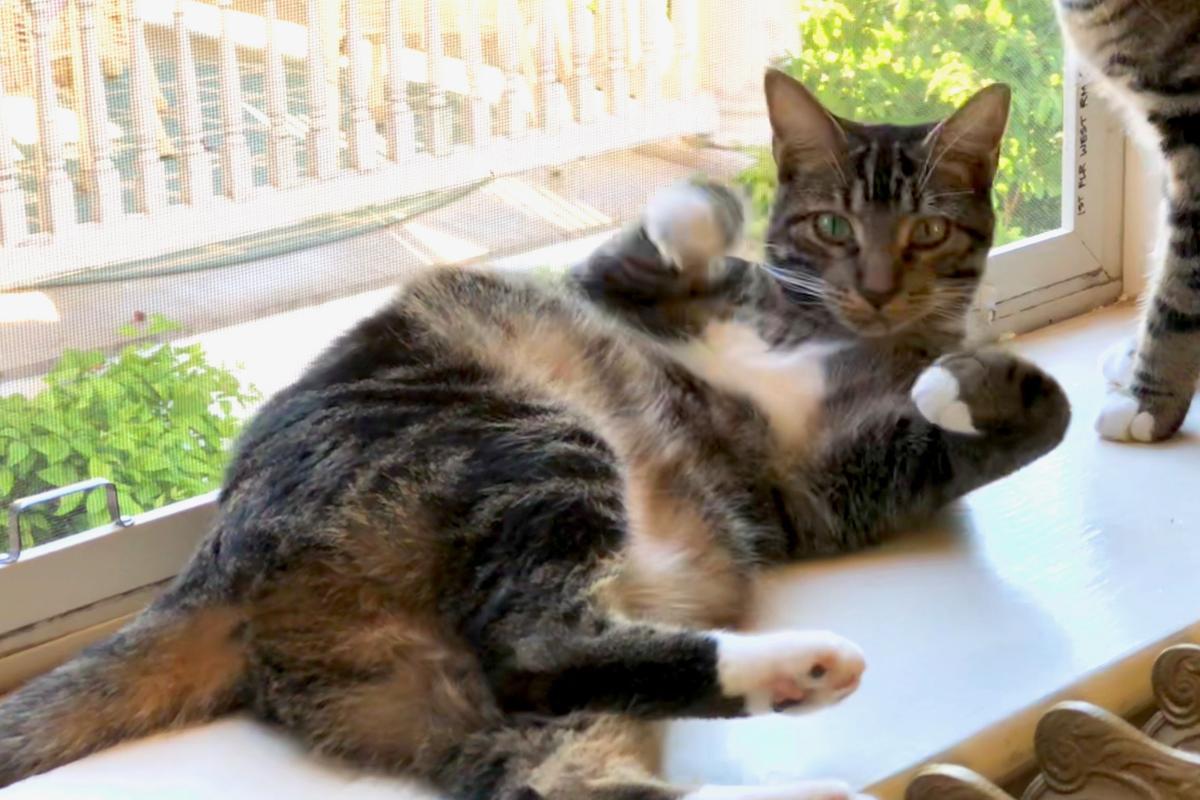My Cat Has a Bloated and Soft Stomach



See files for Cats
Mistaking a bloated belly in a cat for simply eating too much could be a costly mistake. Although gastrointestinal problems are a common cause of feline distended abdomen, there are many causes which can result in this symptom. Some causes can be easily treatable, others can be life threatening. For this reason, it is very important we look at the context of a swollen stomach in cats. One of the most important factors is whether the belly is soft or hard, but it is also vital we look to see if the cat has any other symptoms such as lethargy, diarrhea or loss of appetite.
At AnimalWised, we discover the many reasons why my cat has a bloated and soft stomach. Although we look at the causes of a distended abdomen in felines, it is very important to have this symptom diagnosed by a veterinarian.
Feline infectious peritonitis
Feline infectious peritonitis (FIP) is a viral disease that affects cats. It is characterized by being a progressive, debilitating and practically fatal process. It is an infection caused by a a type of RNA virus, specifically the feline coronavirus (FCoV).
This virus enters the cat's intestinal cells where it then multiplies. This results in mild diarrhea that is usually self-limiting. In less than 20% of cats, the virus mutates. This gives it the capacity to infect macrophages and distribute throughout the body.
The fact that your cat has a swollen belly occurs in the most serious form of feline infections peritonitis. In cases, of FIP, the cat's stomach can be hard, firm or soft, depending on the type of FIP present. These are classified as the following:
- Wet FIP: the cat develops ascites, a fluid accumulation which is the result of the immune response as blood vessels leak into the abdominal cavity. This is soft to the touch, but it can be firmer if fibrous tissue forms in the area.
- Dry FIP: granulomas form as a result of inflammatory cells being produced by the immune response. These can be large or small, but are firm to the touch on palpation.
Wet FIP is considered more immediately life threatening, but they are both very serious reasons why a cat's stomach is bloated. An infiltration of macrophages in the tissue around the blood vessels can deposit immune complexes in the same vessels, as well as cause damage to the vascular endothelium. Painless ascites with yellowish effusions due to a high albumin content occurs in 60% of cats.
What to do if a cat has a bloated belly due to FIP
There is no direct cure for feline peritonitis. Managing the symptoms is the only way to reduce the stomach bloating and strengthen the immune system against the virus. This may require:
- Food rich in protein
- Vitamin administration
- Proteolytic enzymes
- Fluid therapy to replace fluid
- Dexamethasone injections into the abdominal cavity to prevent effusion
- Administration of feline recombinant omega interferon (FelFN-w) to enhance the cellular immune system.
It should be noted that in recent years two drugs with good efficacy and safety have been studied to treat FIP. These are Remdesivir and nucleoside analogue GS-441524, the former being the parent compound of the latter.
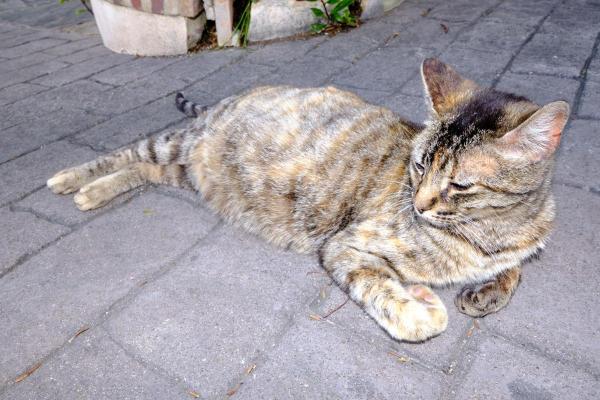
Congestive heart failure
It is understandable we may not link a cat's bloated and soft stomach with heart disease, but the two are directly related. Congestive heart failure in cats causes the heart to be unable to supply the necessary blood and oxygen amounts to the rest of cat's body. In felines, hypertrophic cardiomyopathy is the heart disease that is usually responsible for this problem. This a pathology that consists of the thickening of the heart walls, making it difficult for them to stretch and fill with the necessary amount of blood to be pumped through the body.
When this occurs, our cats may begin to accumulate fluid in the lungs or abdomen. This causes a distended abdomen which is soft upon palpation. In addition, cats with hypertrophic cardiomyopathy may present clinical signs such as:
- Weakness
- Lethargy
- Loss of appetite
- Hypertension
- Difficult and rapid breathing
What to do if congestive heart failure causes a bloated stomach
In addition to draining effusions or using diuretics, the main problems related to cardiomyopathy must be controlled. For example, amlodipine is used to control hypertension. To reduce the workload of the heart, drugs from the group of Angiotensin-converting-enzyme inhibitors (ACE inhibitors) may be used. Cardiac muscle relaxants such as beta blockers can also help with hypertension and lowering heart rate.
Tumor
Feline abdominal distension can also be a result of tumors. The nature of the tumor such as location and size can affect its consistency. For this reason, it is possible a cat's stomach is bloated and soft due to certain types of cat tumor, but it may be hard with others. Some abdominal tumors can cause ascites or abdominal effusion in our felines. Diagnosis occurs when a sample of the fluid is analyzed and tumor cells are detected.
In cats, the tumor that can most frequently trigger an abdominal effusion is lymphosarcoma. The soft bloating occurs when it ruptures into the abdominal cavity.
Some symptoms of intestinal lymphosarcoma in cats are:
- Vomiting
- Diarrhea
- Increased thirst and urination
- Lethargy
- Weight loss
- Anorexia
To treat this problem, chemotherapy, radiotherapy and/or surgery should be performed. It will need to be diagnosed by a veterinarian. Since it is a malignant form of cancerous tumor, the cat will die without treatment. Learn more about malignant tumors with our article on the stages of breast cancer in cats.
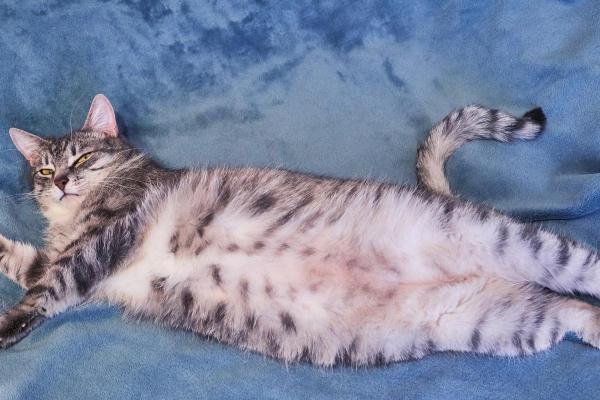
Hypoalbuminemia
When a cat has a bloated and soft belly, the abdomen may contain a transparent and watery liquid with a density of less than 1013 and less than 1g/dl. This fluid produces practically no sediment during centrifugation and there will be almost no cells in a smear.
This liquid is called pure transudate and occurs when there is hypoalbuminemia (i.e. a lack of albumin protein). The cat is considered hypoalbuminemic when the cat's total proteins are less than 2 g/dl. This loss or lack of albumin formation can be due to causes such as:
- Liver diseases
- Diseases that affect the renal glomerulus
- Protein-losing enteropathies
To treat hypoalbuminemia in cats and reduce the soft bloating of their belly, the levels of this protein must be restored to normal levels. This is in addition to controlling the specific disease or pathology that is causing low albumin levels in the cat.
Elevating albumin levels can be done through fluid therapy. The fluid may contain synthetic colloids such as modified fluid gelatin, dextrans or HES (hydroxyethyl starch) solutions. Plasma or whole blood transfusions can also help, although these should always be performed with a blood group test to avoid incompatibilities.
Learn more about reasons for stomach bloating and other inflammation with our article on lumps under a cat's skin.
Abdominal trauma
When a cat has a bloated and soft belly, the fluid inside may be bloody and cloudy. This is an indication it contains a high amount of red blood cells.
The presence of blood in the peritoneal cavity of the abdomen is known as hemoperitoneum. It is generally due to rupture of an important organ such as the spleen, liver or kidney. It is rare for hemoperitoneum to occur without trauma. It may appear in cases in which a tumor has ruptured in the abdominal cavity or as a result of coagulopathy.
As a consequence of trauma, a chyloabdomen can also occur in which the fluid in this case is cloudy and milky and whitish in appearance. Although it is rare in cats, it can occur as a consequence of rupture of lymphatic vessels in a trauma.
A uroabdomen can also occur after trauma and can explain why a cat has a bulging and soft abdomen. This consists of the accumulation of urine in the peritoneal cavity of our cats coming from the bladder, proximal urethra, kidney or ureters. In most cases of trauma, it is usually due to rupture of the urinary bladder. Urine in the abdominal cavity is very dangerous due to chemical irritation of the urine and severe metabolic changes which can occur.
The treatment in these cases is surgical. The veterinary surgeon will try to repair the organic damage if possible, although many of these cases have fatal consequences for the cat.
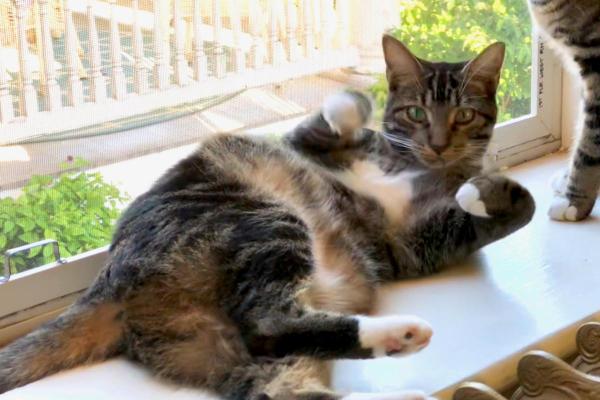
Pyoperitoneum
A cat with a bloated and soft belly presents pyoperitoneum when the abdominal fluid is yellowish-white and cloudy. This indicates the presence of pus in the abdominal cavity. This is because inflammation cells and bacteria can be evident in the sediment.
The main causes that can explain pyoperitoneum in the feline species are:
- Digestive perforations
- Perforations of the uterus due to pyometra in females
- Abscess ruptures
- Bacterial peritonitis
It should be noted, these last two causes of pyoperitoneum in cats are rare. To treat pyoperitoneum in cats, the cause that is producing it must be controlled, using antibiotics for cats and other drugs. Surgery may be required, depending on the underlying cause. For example, perforations may need to be repaired surgically.
Now we have discovered the reasons why a cat's stomach is bloated and soft, you may want to take a look at our related article on why a cat's belly is bloated and hard.
This article is purely informative. AnimalWised does not have the authority to prescribe any veterinary treatment or create a diagnosis. We invite you to take your pet to the veterinarian if they are suffering from any condition or pain.
If you want to read similar articles to My Cat Has a Bloated and Soft Stomach, we recommend you visit our Other health problems category.




